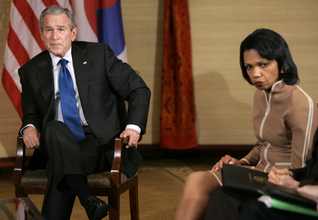U.S. Retreat from Iraq? The Secret Story


By Tom Hayden
Special to the Huffington Post
11/22/06 "HP" -- - - According to credible Iraqi sources in London and Amman, a secret story of America’s diplomatic exit strategy from Iraq is rapidly unfolding. The key events include:
First, James Baker told one of Saddam Hussein’s lawyers that Tariq Aziz, former deputy prime minister, would be released from detention by the end of this year, in hope that he will negotiate with the US on behalf of the Baath Party leadership. The discussion recently took place in Amman, according to the Iraqi paper al-Quds al-Arabi.
Second, Secretary of State Condoleeza Rice personally appealed to the Gulf Cooperation Council in October to serve as intermediaries between the US and armed Sunni resistance groups [not including al Qaeda], communicating a US willingness to negotiate with them at any time or place. Speaking in early October, Rice joked that if then-Secretary of Defense Donald Rumsfeld “heard me now, he would wage a war on me fiercer and hotter than he waged on Iraq”, according to an Arab diplomat privy to the closed session.
Third, there was an “unprecedented” secret meeting of high-level Americans and representatives of “a primary component of the Iraqi resistance” two weeks ago, lasting for three days. As a result, the Iraqis agreed to return to the talks in the next two weeks with a response for the American side, according to Jordanian press leaks and al-Quds al-Arabi.
Fourth, detailed email transmissions dated November 16 reveal an active American effort behind the scenes to broker a peace agreement with Iraqi resistance leaders, a plot that could include a political coup against Prime Minister Nuri al-Maliki.
Fifth, Bush security adviser Stephen Hadley carried a six-point message for Iraqi officials on his recent trip to Baghdad: include Iraqi resistance and opposition leaders in any initiative towards national reconciliation;general amnesty for the armed resistance fighters;
dissolve the Iraqi commission charged with banning the Baath Party; start the disbanding of militias and death squads;
cancel any federalism proposal to divide Iraq into three regions, and combine central authority for the central government with greater self-rule for local governors; distribute oil revenues in a fair manner to all Iraqis, including the Sunnis whose regions lack the resource.
Prime Minister Al-Maliki was unable to accept the American proposals because of his institutional allegiance to Shiite parties who believe their historic moment has arrived after one thousand years of Sunni domination. That Shiite refusal has accelerated secret American efforts to pressure, re-organize, or remove the elected al-Maliki regime from power.
The Back Story >>>cont
LinkHere




0 Comments:
Post a Comment
<< Home